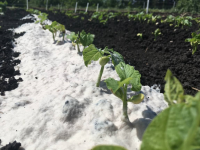About
Project Goals
Reducing plastic pollution while maintaining horticultural productivity and profitability is the critical need addressed by this project. Currently, organic horticultural producers are heavily reliant on non-biodegradable plastic mulches for weed suppression, soil temperature modification, and soil moisture conservation; however, disposal of these mulches is expensive and environmentally unsound. Biodegradable plastic mulches (BDM) are available, but currently no commercially available BDMs meet the NOP’s requirements because none consist of 100% bio-based feedstocks and many feedstocks are sourced from GMOs.
 The overall goal of the proposed research is to develop composite cellulose-based hydro-applied biodegradable mulches (i.e., hydromulches) to replace non-biodegradable plastic mulches in organic horticultural systems. Furthermore, we propose to develop and evaluate hydromulch formulations using non-synthetic, non-GMO materials that will biodegrade in the soil similarly to crop residues, thereby creating an ecologically sound alternative to BDMs that conforms to NOP requirements. Our new hydromulch formulations, unlike most commercial products, will not contain proprietary ingredients or be produced using proprietary processes. Therefore, these hydromulches will be ‘open source’ in the sense that organic producers will be able to use and adapt the hydromulches as they wish to suit their particular needs, local availability of feedstock materials, and production systems.
The overall goal of the proposed research is to develop composite cellulose-based hydro-applied biodegradable mulches (i.e., hydromulches) to replace non-biodegradable plastic mulches in organic horticultural systems. Furthermore, we propose to develop and evaluate hydromulch formulations using non-synthetic, non-GMO materials that will biodegrade in the soil similarly to crop residues, thereby creating an ecologically sound alternative to BDMs that conforms to NOP requirements. Our new hydromulch formulations, unlike most commercial products, will not contain proprietary ingredients or be produced using proprietary processes. Therefore, these hydromulches will be ‘open source’ in the sense that organic producers will be able to use and adapt the hydromulches as they wish to suit their particular needs, local availability of feedstock materials, and production systems.
We will test these hydromulches in organic strawberry, blueberry, onion, and broccoli production systems. We will assess hydromulch impacts on weed suppression, weed community composition, and crop yield, and we will also quantify other important agroecosystem impacts, including the impacts of hydromulch presence and degradation on crop nutrition and numerous soil health indicators.
Project objectives
Overall Objective: Design, develop and evaluate the performance (weed suppression, crop quality and yield), ecological (soil health impacts), and economic impacts associated with using biodegradable composite hydromulches in organic horticultural production systems.
- Sub-Objective 1: Design and develop biodegradable composite hydromulch formulations; evaluate hydromulch formulation impact on weed suppressive ability.
- Sub-Objective 2: Develop and test hydromulch application technologies in North Dakota and Washington State.
- Sub-Objective 3: Evaluate hydromulch efficacy and impact on crop quality and yield in annual day-neutral strawberry production systems.
- Sub-Objective 4: Evaluate hydromulch efficacy and impact on crop quality and yield and soil health indicators in perennial blueberry production and in annual market vegetable production.
- Sub-Objective 5: Assess the economic impacts of hydromulch applications in the organic production of blueberry, onion, and broccoli via cost-benefit analyses.
- Sub-Objective 6: Conduct outreach and extension activities to disseminate results to stakeholders, including organic farmers and the scientific community.
Results from this proposed project will be shared via eOrganic articles, YouTube video presentations, webinars, field days, extension articles, popular press articles, grower conferences, scientific conferences, and peer reviewed scientific articles, which will be available on this website!
Funding

This project was funded in 2021 by the Organic Research and Extension Initiative grant, part of the USDA National Institute of Food and Agriculture. Grant number 2021-51300-34909.
